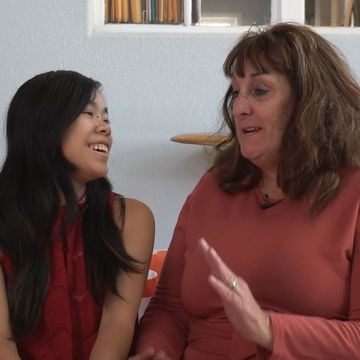New Mexico Approves Master of Science in Anesthesia Program at UNM

The Road to Recovery
UNM Doctor's Dedication Helps a Teen Survive a Life-Threatening Illness
Entering ninth grade, Lennon Washburn was healthy as could be - an excellent student with dreams of becoming a ballet dancer.
But then she started experience excruciating pain in her stomach, arms and joints that soon spread throughout her body. The symptoms worsened until her parents rushed her to The University of New Mexico Hospital.
"At that point I wasn't even sure where UNM Hospital was," says Lennon's mother Jeanne Washburn. "Now, we're in the pediatric ER and we're told she needs a blood transfusion. I thought they were nuts."
It was the first in a nightmarish round of hospital admissions and readmissions as Lennon's doctors struggled to figure out what was wrong. Lennon's weight plummeted and she grew sicker as she underwent multiple transfusions and rotated in and out of the pediatric intensive care unit.
Her doctors speculated that she might have Crohn's disease - an inflammatory bowel condition - and asked whether there was a family history. Jeanne didn't know, as both Lennon and her sister, Tess, had been adopted in China as toddlers.
But one doctor had another theory. Ioannis Kalampokis, MD, PhD, assistant professor of Pediatrics and the state's only pediatric rheumatologist, thought Lennon's symptoms did not resemble Crohn's.
"He took me aside and said, 'You know, this looks like vasculitis,'" Jeanne remembers. "I said, 'I'm sorry, I don't know what that is.'" Kalampokis said he hoped that Lennon didn't have the disorder.
"Little did we know that that was my medical condition," says Lennon, now 18 and in her final year of high school." Emergency surgery to remove six inches of small intestine confirmed vasculitis - chronic inflammation of the small blood vessels in her gut - an extremely rare form of the disease.
Kalampokis could find only one other reported case that matched Lennon's - that of a boy in Saudi Arabia several decades ago.
"What's very strange about this case is that the case that Dr. K. found was the only other case in the world that was documented to have this type of vasculitis," Lennon says. "So we went on with the same treatment that was recorded from this case in 2001. We had no idea of whether it was going to work - it was an older treatment."
Kalampokis put Lennon on a form of chemotherapy for six months, while also prescribing an unusually high dose of steroids for two years to bring her symptoms under control.
"I experienced hair loss for a long time," Lennon says. "I ended up getting moon-faced from the steroids because of the amount I was on."
But over time, the treatment worked. Lennon's symptoms subsided, she started regaining weight and she was able to return to school. Kalampokis slowly weaned her from the powerful drugs he had prescribed. Today, she takes pills twice a day, but otherwise leads a normal life.
Now Lennon, who will graduate high school next spring, has a new passion.
"Dr. K. has inspired me to want to become a pediatric rheumatologist," she says. "I hope to one day to help children who are going through the same experience as I had. I want to help them find cures and treat them and be there for them and be that support that Dr. K. was for us and our family.
Lennon also is spending time shadowing Kalampokis in his clinic at Carrie Tingley Hospital - a first step toward someday applying to medical school.
"Lennon is one of the most remarkable young ladies I've ever encountered," Kalampokis says. "Lennon has something that doesn't qualify for any of the known diagnoses that we have."
Her recovery is "kind of surreal, sometimes," he says. "I have to pinch myself - it is just so satisfying. It's the greatest reward I have ever received in my life, and ever will."
Kalampokis attributes much of Lennon's remarkable recovery to her willingness to do whatever it took to get better.
"She has been so compliant, so determined," he says. "She has done 150% of whatever I ask her to do. Lennon is very, very, very special . . . she will become way better than any other pediatric rheumatologist I have ever encountered, including, of course, myself.
"She is a very special human being. I'm looking forward to seeing her growing and becoming the person she wants to become."